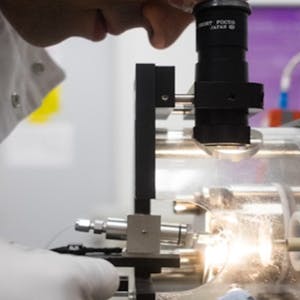Industrial Biotechnology
About this Course
Fossil fuels have been the primary energy source for society since the Industrial Revolution. They provide the raw material for the manufacture of many everyday products that we take for granted, including pharmaceuticals, food and drink, materials, plastics and personal care. As the 21st century progresses we need solutions for the manufacture of chemicals that are smarter, more predictable and more sustainable. Industrial biotechnology is changing how we manufacture chemicals and materials, as well as providing us with a source of renewable energy. It is at the core of sustainable manufacturing processes and an attractive alternative to traditional manufacturing technologies to commercially advance and transform priority industrial sectors yielding more and more viable solutions for our environment in the form of new chemicals, new materials and bioenergy. This course will cover the key enabling technologies that underpin biotechnology research including enzyme discovery and engineering, systems and synthetic biology and biochemical and process engineering. Much of this material will be delivered through lectures to ensure that you have a solid foundation in these key areas. We will also consider the wider issues involved in sustainable manufacturing including responsible research innovation and bioethics. In the second part of the course we will look at how these technologies translate into real world applications which benefit society and impact our everyday lives. This will include input from our industry stakeholders and collaborators working in the pharmaceutical, chemicals and biofuels industries. By the end of this course you will be able to: 1. Understand enzymatic function and catalysis. 2. Explain the technologies and methodologies underpinning systems and synthetic biology. 3. Explain the diversity of synthetic biology application and discuss the different ethical and regulatory/governance challenges involved in this research. 4. Understand the principles and role of bioprocessing and biochemical engineering in industrial biotechnology. 5. Have an informed discussion of the key enabling technologies underpinning research in industrial biotechnology 6. Give examples of industrial biotechnology products and processes and their application in healthcare, agriculture, fine chemicals, energy and the environment.Created by: University of Manchester

Related Online Courses
In the rapidly evolving world of finance, algorithmic trading strategies powered by generative AI (GenAI) are transforming how traders approach the markets. This hands-on course is designed to... more
This Introduction to Juniper Cloud Concepts specialization provides students with the foundational knowledge required to with basic cloud components in a Juniper environment. The course summarizes... more
This is a self-paced lab that takes place in the Google Cloud console. This lab focuses on how to reverse-engineer the relationships between data tables and the pitfalls to avoid when joining them... more
Organisations are undergoing enormous changes in their structures and processes as they seek to take advantage of innovations in technology, remain competitive in Globalising markets, and deal with... more
This is an introductory course on options and other financial derivatives, and their applications to risk management. We will start with defining derivatives and options, continue with... more








